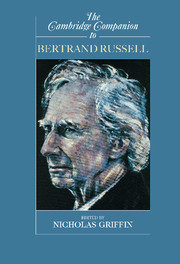Book contents
- Frontmatter
- Introduction
- 1 Mathematics in and behind Russell’s Logicism, and Its Reception
- 2 Russell’s Philosophical Background
- 3 Russell and Moore, 1898-1905
- 4 Russell and Frege
- 5 Bertrand Russell’s Logicism
- 6 The Theory of Descriptions
- 7 Russell’s Substitutional Theory
- 8 The Theory of Types
- 9 Russell’s Method of Analysis
- 10 Russell’s Neutral Monism
- 11 The Metaphysics of Logical Atomism
- 12 Russell’s Structuralism and the Absolute Description of the World
- 13 From Knowledge by Acquaintance to Knowledge by Causation
- 14 Russell, Experience, and the Roots of Science
- 15 Bertrand Russell
- Selective Bibliography
- Index
- Series list
3 - Russell and Moore, 1898-1905
Published online by Cambridge University Press: 28 May 2006
- Frontmatter
- Introduction
- 1 Mathematics in and behind Russell’s Logicism, and Its Reception
- 2 Russell’s Philosophical Background
- 3 Russell and Moore, 1898-1905
- 4 Russell and Frege
- 5 Bertrand Russell’s Logicism
- 6 The Theory of Descriptions
- 7 Russell’s Substitutional Theory
- 8 The Theory of Types
- 9 Russell’s Method of Analysis
- 10 Russell’s Neutral Monism
- 11 The Metaphysics of Logical Atomism
- 12 Russell’s Structuralism and the Absolute Description of the World
- 13 From Knowledge by Acquaintance to Knowledge by Causation
- 14 Russell, Experience, and the Roots of Science
- 15 Bertrand Russell
- Selective Bibliography
- Index
- Series list
Summary
When Russell and Moore entered Trinity College, Cambridge (in 1890 and 1892, respectively), the prevailing philosophies there, and elsewhere in Britain, were forms of idealism: Kant and Hegel were the heroes of the past, and F. H. Bradley of the present. It was chiefly through association with J.M.E. McTaggart, as both a teacher and a friend, that Moore and Russell absorbed idealism and, as Moore was later to put it, became for a time “enthusiastic admirers” of Bradley. But only for a time. It has been said that the beginning of Russell's break with Idealism can be discerned in a paper read to the Apostles on 11 December 1897, in which he argued that “for all purposes which are not purely intellectual, the world of Appearance is the real world - agin McTaggart's notion of getting religion out of philosophy”. Russell himself describes the revolt this way:
It was towards the end of 1898 that Moore and I rebelled against both Kant and Hegel. Moore led the way, but I followed closely in his footsteps. I think that the first published account of the new philosophy was Moore’s article in Mind on ‘The Nature of Judgement’. Although neither he nor I would now adhere to all the doctrines in that article, I, and I think he, would still agree with its negative part – i.e. with the doctrine that fact is in general independent of experience
(MPD, p. 42).The opening sentence of Russell’s three-part article on Meinong, written probably in the first half of 1903, contains a succinct statement of certain elements of the “new philosophy”:
That every presentation and every belief must have an object other than itself and, except in certain cases where mental existents happen to be concerned, extramental; that what is commonly called perception has as its object an existential proposition, into which enters as a constituent that whose existence is concerned, and not the idea of this existent; that truth and falsehood apply not to beliefs, but to their objects; and that the object of a thought, even when this object does not exist, has a Being which is in no way dependent on its being an object of thought: all these are theses which, though generally rejected, can nevertheless be supported by arguments which deserve at least a refutation.
(MTCA, Papers 4, p. 432)- Type
- Chapter
- Information
- The Cambridge Companion to Bertrand Russell , pp. 108 - 127Publisher: Cambridge University PressPrint publication year: 2003
- 3
- Cited by



